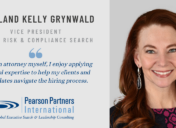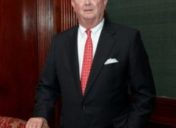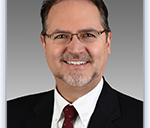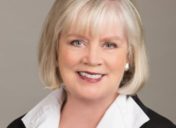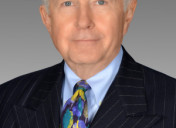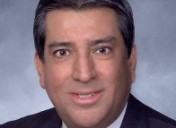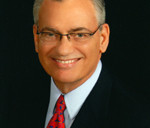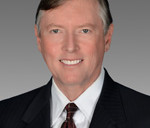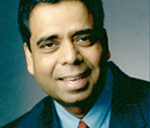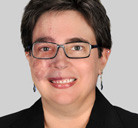Profile: Dr. Robert J. Potter
President, R. J. Potter Company, and member of Pearson Partners’ Advisory Board
As featured in our Q4 2014 Searchlight newsletter

Bob Potter, Ph.D., pictured in front of Bob Potter’s Alley, a student computer space at Illinois Institute of Technology dedicated for his generosity and service to the university
What was your first job, and what was it like?
When I was 12 years old, I learned how to develop roll film and make contact prints for friends and neighbors, for which I charged 50 cents a roll. So my first job was really the launch of a photography business that grew over the next nine years to provide a significant income for me. I had several part-time dark room people and numerous part-time salespeople working for me, so this business was also an introduction to the challenges and benefits of managing people in a real business.
What is your business background?
I had numerous part-time jobs as a teenager, college student and graduate student; they were all steps toward my education and my plan to work in large technology companies. After earning my Ph.D., I became a full-time employee of IBM, followed by Xerox, International Harvester, Nortel Networks and Datapoint. I started as a technical person, then a technical manager, and evolved into a general manager, then division president, and ultimately, chief executive officer of a New York Stock Exchange company. During this time, and after my 30-year career in corporate America and my subsequent evolution into a solo consulting business, I served on numerous non-profit boards, two university boards, several private company boards and six public company boards of directors.
What are some highlights of your career so far? Tell us about your best days or proudest moments.
I am proud to have written the first doctoral dissertation on fiber optics in the United States. I have made many innovative technical contributions to the design of punched card readers, credit cards to be read by optical character recognition machines, systems to read documents, word processing machines, computer printers, telecommunication products, and networks. I’ve also contributed to health care, agricultural equipment, construction equipment, motor vehicles and other businesses. Some of my responsibilities involved launching new products and new industries. I am particularly proud to have turned a large business entity losing $40 million annually into one earning $40 million, in less than three years.
What drew you to Pearson Partners?
I have known Bob Pearson for several decades. He is an exceptional person of extraordinarily strong character with great management skills, and he is a superb search executive. The launch of Pearson Partners created a growing business unit for an exclusive group of partners and associates. I am pleased to play an advisory role for this firm.
Describe your leadership style.
I practice a “wide open door” leadership style, so that any employee reporting directly to me or deeper in my organization feels free to communicate directly with me. I am honest, dependable, clear, open-minded, customer-sensitive and responsive. People tell me that I am a particularly effective communicator. I am concise and precise on all subjects, strategy, rules, targets, compensation, performance and problems. I work hard to have a good relationship with my customers, employees, suppliers and competitors. I respond promptly to new ideas and problems.
What is your philosophy or approach when it comes to client relationships?
I treat customers with high priority, whether they are clients of Pearson Partners or buyers of a manufacturer’s product line. I work hard to ensure that the interface between the customer and my organization is honest, simple, wide and efficient.
How have you seen Pearson Partners International grow and change over your tenure?
I’ve seen Pearson Partners International prosper as its client list has grown long and wide. Keith Pearson has risen to his role as CEO, and several new employees have come on board.
What do you think are some of the key issues or challenges in executive search right now?
A very important issue for all executive search firms is distinguishing themselves from their competitors. It is hard for executive search firms to be profoundly different from others, large or small. Therefore, it is important to develop unique business models, marketing techniques and execution to provide extraordinary results that can become known by prospects.
What is a lesson you have learned?
Nothing focuses people better than being told exactly how they are going to be paid.
What do you like to do outside of the office? Hobbies or passions?
I like to read books about high-impact people, such as Teddy Roosevelt, Johnny Carson, Cleopatra, Frank Sinatra, George Patton, John Kennedy, Benjamin Franklin, Albert Einstein, Steve Jobs, among others. I enjoy fixing anything that is broken, large or small, machines or devices. Sometimes this probably takes more time and energy than the projects are worth. I also like to feed wild birds in our backyard and take well-planned and efficient trips to interesting places.
Where has been your favorite place(s) to travel?
We’ve traveled to a wide variety of cities and countries, including developed and underdeveloped locations around the world. My favorite place is the next one I will visit.
What motto do you live by?
Address and understand new topics, and spend time on subjects that are valuable and satisfying. Work on them carefully and thoroughly.
If you had to make a career change tomorrow, what job would you choose, and why?
I cannot think of anything I would rather do than what I am doing right now.

